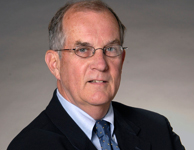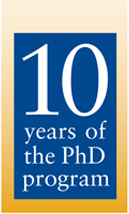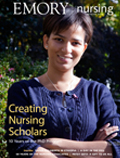Creating nursing scholars
A decade-old program takes on the U.S. shortage of doctorally prepared nurses.
by Sylvia Wrobel
|
Global science: saving mothers and infants Getting down to research: from BSN to PhD |
For those who worry about the nursing shortage, consider the greater scarcity of nurses educated at the doctoral level—those who will be the teachers of those who fill the shortage. This national shortage of PhD-prepared nurses is occurring just as nursing and health care in general need highly trained, research-oriented professionals the most.
The School of Nursing is helping fill that void. Today, the school has 20 PhD graduates, and 16 students are working toward their doctoral degrees. Another three to six students will begin their studies this fall. Now a decade old, the doctoral program remains purposely small. The faculty-student ratio is low, while the mentoring of future researchers is high. By learning from nursing faculty and faculty from other disciplines across the university, students can devise and conduct highly individualized programs of study and research.
“Our goal in the doctoral program,” says Ken Hepburn, associate dean for research and director of graduate studies, “is to prepare the next generation of scientists who can bring the nursing perspective to bear in confronting issues of human health, health care, and health policy, and who can create knowledge to improve nursing and health care.”
Most of Emory’s nursing PhD graduates hold faculty roles in nursing schools. Their impact on the nursing workforce can hardly be overstated. The U.S. Bureau of Labor Statistics projects that more than 1 million new and replacement nurses will be needed by 2016, making nursing the nation’s top profession in terms of projected job growth. Nursing has never been a more popular career choice, among women as well as men. But the American Association of Colleges of Nursing reports that nursing school enrollment is not growing fast enough to meet demand. Almost two-thirds of nursing schools must turn away qualified students because they lack qualified faculty to teach them.
 |
“Creating researchers who are both interdisciplinary and imbued with the nursing perspective is helping put nursing science more firmly at the research table.” —Ken Hepburn, associate dean for research and director of graduate studies |
|||
The influence of PhD graduates in nursing extends beyond the immediate arena of the classroom. Nursing scholars are engaged—often in collaboration with their colleagues in clinical settings—in generating the evidence that leads to improved practices. These evidence-based practices then form the basis for teaching nursing undergraduates and graduate students and providing cutting-edge care to patients.
While virtually all of Emory’s PhD nursing graduates are involved in university research, some work outside of the academic setting. Carolyn Constantin 03PhD—the school’s first PhD recipient—is a health scientist specializing in birth defects and developmental disabilities with the CDC. Laura Strange 81MSN 04PhD serves as the clinical studies director for the Atlanta office of RTI International, a nonprofit research organization. Lucia Gonzales 04PhD, a clinical research administrator with Virtua Health in New Jersey, partnered with Rowan University to provide onsite undergraduate education for Virtua staff nurses.
Historically, students entering PhD programs in the United States are about a decade older than students entering other doctoral fields. While these older students bring to their studies—and younger classmates—valuable clinical and life experiences, they graduate with fewer years for research and teaching ahead. While the more traditional master’s degree to PhD route is still available, the nursing school encourages earlier entry by bachelor’s-prepared students. This option allows less clinically experienced students to take extra clinical courses while fulfilling the traditional requirements of the PhD program.
All PhD students face challenges, says Hepburn. Younger students who have not had the opportunity to work and repay students loans may find it difficult to enter a multi-year doctoral program. Mid-career students are more likely to have some savings but also juggle mortgages, college savings for their children, and retirement funds—and they have to remember how to be students again. For those who choose Emory’s PhD program in nursing, the excitement and promise of a new degree, new skills and knowledge, and broader career options far outweigh the sacrifices.“Having a flourishing doctoral program, a faculty robustly engaged in research, and cohorts of graduate students excited about developing their capacity for inquiry creates a context which makes our undergraduate program stronger,” says Hepburn. “And creating researchers who are both interdisciplinary and imbued with the nursing perspective is helping put nursing science more firmly at the research table. The presence of an accomplished nursing science cadre leads to a greater appreciation of all that nursing is and can be.”
Atlanta freelancer Sylvia Wrobel is a frequent contributor to Emory’s health sciences publications.



